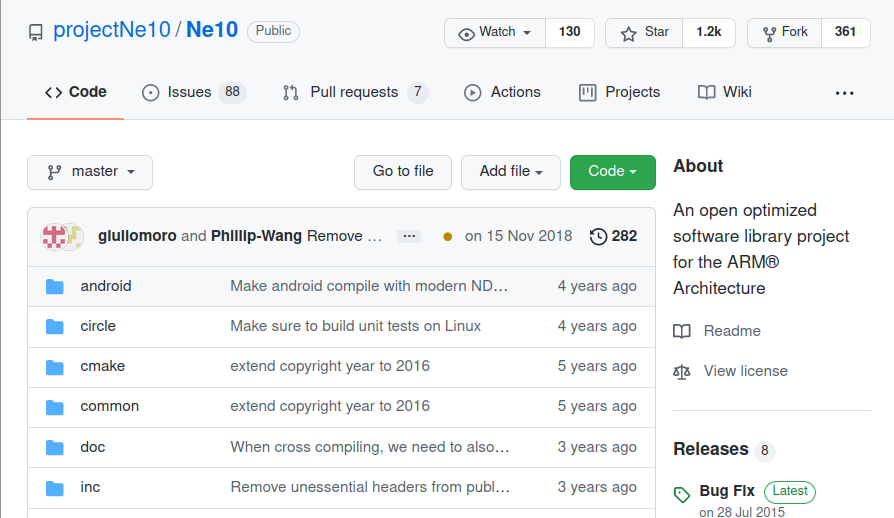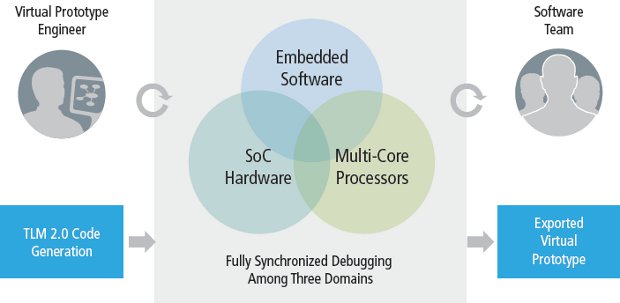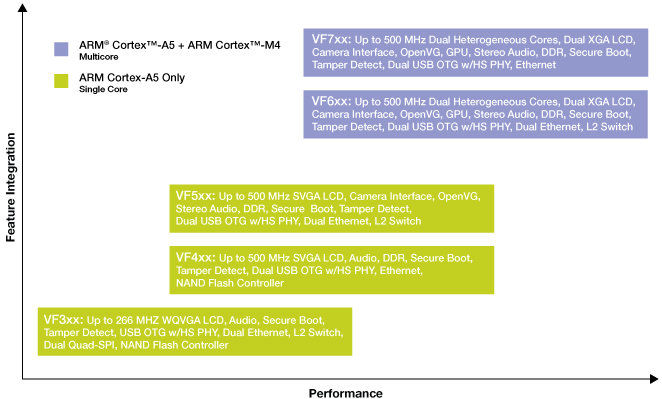ARM has shot a few video demos of their ARM Development Studio 5 (DS 5), a software development tool suite for ARM platforms, at Design West 2012. The first video shows DS 5 running on the Xilinx Zynq-7000 platform (dual cortex A9 + FPGA), and we can see the memory map, registers, call graphs and stack usage. We can also see real-time processor switching and the function that takes the most CPU resources (profiling). The second videos showcases ARM DS-5 Streamline, a performance analyzer, which helps determine how well programs are running on a Linux or Android platform, on an Samsung Exynos 4210 platform (Origen board?). This tool also to profile both the dual-core ARM Cortex-A9 and ARM Mali-400 MP GPU in the platform. We are shown three types of reports: CPU/GPU Loading Threads usage Power Usage per application The third and last video shows ARM DS 5 on Freescale i.MX6 […]
Linaro 12.03 Release with Kernel 3.3-rc3
Linaro has just released version 12.03 based on Linux Kernel 3.3-rc3 and Android 4.0.3. Among the key points, hardware video decode in now supported in Origen (Android), Android runs in A15/A7 platforms, libav AAC optimization provides about 2x performance improvement and QEMU supports Samsung Exynos 4240 and Calxeda Highbank (work done upstream). Here are the highlights of the release: Android Linaro Android has support for DS-5 version 5.9. Hardware accelerated Multimedia is now integrated on Origen. EEMBC, denbench and coremark have been ported to Android and are running in LAVA. android.net ConnectivityManager unit tests have been built and integrated in all builds. Hardware decode of H264 and MPEG4, 1080P and 30 FPS is enabled on Origen. Origen now has 1080p HDMI Graphics and Video Support. Android runs on A15, A7 and A15/A7 fast models. ARM’s big.LITTLE has been tested running Android using a set of unit tests. Kernels of prebuilt […]
Xilinx Zynq-7000 Extensible Processing Platform (EPP): Dual Cortex A9 + FPGA SoC
The Xilinx Zynq-7000 EPP (Extensible Processing Platform) is a new class of device, offering a mix of a dual-core ARM Cortex-A9 subsystem (including cache, memory controllers, interface, and peripheral functions) with a 28-nm programmable digital FPGA and programmable analog capabilities. This combination opens the door to a range of demanding applications, including automotive (video processing and analytics requirements for driver assistance systems), broadcast (high-bit-rate bandwidth for high-accuracy video processing and analytics), and industrial control systems that combine high-processing demands with tight integration requirements. There are actually 4 models which share the same processing subsystem (CPU core, memory, peripherals, etc…) and only differ by the programmable logic used: Z-7010 – Artix-7 FPGA with 28K logic cells. Z-7020 – Artix-7 FPGA with 85K logic cells. Z-7030 – Kintex-7 FPGA with 125K logic cells. Z-7045 – Kintex-7 FPGA with 350K logic cells. The Zynq-7000 EPP platform allows concurrent software and hardware development: System […]
ARM Releases Ne10: An Open Source Library with NEON Optimized Functions
The Advanced SIMD extension (aka NEON or “MPE” Media Processing Engine) is a combined 64- and 128-bit single instruction multiple data (SIMD) instruction set that provides standardized acceleration for media and signal processing applications for ARM Cortex-A (ARMv7) processors and the goal of these instructions is similar to MMX, SSE, and 3DNow! extensions for x86 processors. Starting early 2011, ARM has been working internally on a project codenamed Snappy to develop common functions accelerated by NEON. They have now released the first version of Snappy, now called the Ne10 library, which is available on GitHub at https://github.com/projectNe10/Ne10 . The code has been developed in C and Assembler and tested on Ubuntu on ARM (Linaro). A Makefile is also included to build it for Android (AOSP). The current functions include vector and matrix operations accelerated by NEON instructions. Since the library is open source, ARM hopes developers will make use of the Ne10 […]
Virtual Hardware Platforms: Test & Debug Software Before the Silicon is Ready
Historically software could only be tested and debugged when the first silicon sample was ready, and the software team could not participate in the design process. But thanks to Virtual Hardware Platforms, software can be executed at speeds close to real time on an abstract model of the hardware, available long before a design has been completed. The virtual platform is designed to simplify the creation and support of virtual prototypes and allow design teams to begin developing software weeks to months before a hardware prototype is available, and software teams can use it as their application development platform. For example, Freescale is using a Virtual Hardware Platform for their new Vybrid Controllers to emulate both Cortex A5 and Cortex M4 cores, as well as peripherals and run OS such as Linux or MQX before the Controllers are ready (Q2 2012). One Virtual Hardware Platform has just won the ACE […]
Cross-compiling the ARM Linux Kernel in Ubuntu 12.04 LTS
Yesterday I installed Ubuntu 12.04 ‘Precise’ Beta 1 in Virtual Box to give it a try (I could not manage to have HUD working btw), and today, I’ve noticed an article entitled “Ubuntu 12.04 ‘precise’ and cross compilation of ARM kernels” explaining how to build Linaro ARM kernel in Ubuntu 12.04. So I’ve decided to give it a try, especially it seems straightforward. I followed the instructions in the aforementioned link, it basically worked except I had to install dpkg-dev package that also installed the build essentials (gcc, g++, etc…) and use sudo for some commands. You’ll notice the name change for the ARM gcc toolchain as it now uses hard-float by default which seems to provide quite a boost in performance for the Pandaboard. Here are the steps I followed: Install the ARM GCC cross compiler and the development package of dpkg:
|
1 |
sudo apt-get install gcc-arm-linux-gnueabihf dpkg-dev |
Retrieve the kernel source:
|
1 |
apt-get source linux-source-3.2.0 |
Install […]
Freescale Vybrid Controllers: Cortex A5 + Cortex M4 Solutions
Freescale announced the new Vybrid platform based on Cortex A5 application processor and Cortex-M4 MCU (VF6xx and VF7xx family only) which targets building/home automation and control, industrial automation, point-of-sale systems, medical devices, smart energy equipment, and appliances. There are 5 families of Vybrid Controllers which support the following common features: Video/Camera Interface Unit + optional OpenVG GPU (except VF3xx) Up to 800 MHz data rate DDR3 and LPDDR2 support (except VF3xx) USB 2.0 OTF with Integrated PHY (1 or 2 depending on model) Ethernet 10/100 MAC (1 or 2 depending on model) Display controller (WQVGA to XGA resolutions) High-assurance boot with Crypto Acceleration Up to 1.5 MB on chip SRAM NAND Flash controller and Dual Quad-SPI with eXecute-In-Place(XIP) Dual 12-bit ADC and DAC Here are the 5 families of Vybrid platforms and key differentiating features: VF3xx: ARM Cortex-A5 up to 266 MHz, 1x USB 2.0 OTG, 2x Ethernet, display up […]
Glark, an alternative to Grep
grep is a very useful tool to search or filter strings in order to look for files, parse useful info in log files and more. glark is an alternative to grep, it has few features that grep does not such as complex expressions, Perl-compatible regular expressions, and excluding binary files. It also has a more fancy way of display results. It is described as follows in the manpage: Similar to “grep”, “glark” offers: Perl-compatible regular expressions, color highlighting of matches, context around matches, complex expressions (“and” and “or”), grep output emulation, and automatic exclusion of non-text files. Its regular expressions should be familiar to persons experienced in Perl, Python, or Ruby. File may also be a list of files in the form of a path. glark is not installed by default. To install it in Debian/Ubuntu/Mint: sudo apt-get install glark It does not appear to be available in Fedora and […]








